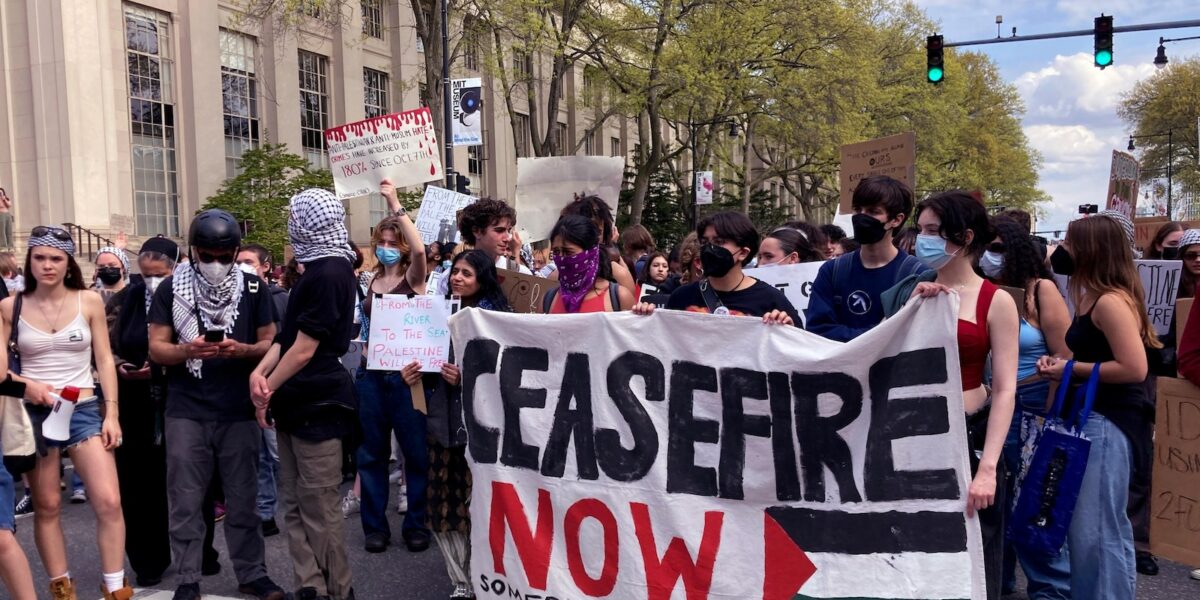NEW YORK — Donald Trump is accusing Joe Biden of offering a weak response to antisemitism, wielding the clashes on colleges campuses over the war in Gaza as a campaign issue. But Trump’s attacks ignore his own long history of rhetoric that invokes the language of Nazi Germany and plays on stereotypes of Jews and politics.
The latest example came over the weekend, when Trump — accusing the White House of having a role in his multiple state and federal criminal prosecutions — told Republican donors gathered for a private retreat at his Florida resort that Biden is running a “Gestapo administration,” referring to the secret police force of Nazi Germany.
Amy Spitalnick, CEO of the Jewish Council for Public Affairs, called it a “deliberate tactic” to attack Biden and distract from his own track record.
“It’s wholly aligned with his long history of offensive and irresponsible comments when it comes to the Jewish community, including the normalization of antisemitism,” Spitalnick said.
Biden’s campaign called it “despicable” and an attack on law enforcement.
Trump’s attempts to claim a moral high ground against antisemitism come as the Democratic president is navigating the intense divisions of the Israel-Hamas war and the resulting unrest from demonstrations. Trump and other Republicans have seized on the disruptions on college campuses, which have at times been violent, as a sign of weakness from Biden and Democrats. It’s also the latest example of Trump’s timeworn tactic of repackaging a censure he’s received and stamping it on his opponents.
As pro-Palestinian demonstrations have broken out at college campuses, some people have reported antisemitic chants and messages at and around the protests and some Jewish students have said they have felt unsafe on campus. Trump’s campaign on Monday released a video on Yom Hashoah, Israel’s Holocaust remembrance day, that aimed to contrast the 2024 presidential candidates’ responses on antisemitism.
The video shows images of Trump visiting Israel and speeches he has given pledging to stand with Jewish people and confront antisemitism, while showing footage of the protests on campuses and clips of Biden responding to protesters upset with his administration’s support for Israel in its war against Hamas.
One of the clips shows Biden saying, “They have a point,” but does not include the next sentence in which Biden said, “We need to get a lot more care into Gaza.”
Karoline Leavitt, national press secretary for Trump’s campaign, criticized Biden for taking “weeks to even talk about the Biden Campus Protests” and not condemning what she described as “pro-Hamas, pro-genocide mobs,” saying “the sad truth is that he needs their votes.”
“Jewish Americans and Jewish leaders around the world recognize that President Trump did more for them and the State of Israel than any President in history,” Leavitt also said Monday.
Trump also spoke about the protests as he arrived in court Monday for his trial in a felony hush money case. Noting Columbia University has canceled its main commencement ceremony following weeks of pro-Palestinian protests, Trump said “that shouldn’t happen.” He also claimed that many protesters were backed by Biden donors.
“Ok, are you listening Israel? I hope you’re listening, Israel. Hope you’re getting smart,” Trump said.
Biden has said he condemns “the antisemitic protests” and last week, he broke days of silence and called for “order” after some schools cleared demonstrators by force, leading to clashes.
James Singer, a spokesperson for Biden’s campaign, said Biden stands against antisemitism but Trump does not.
“Trump has praised neo-Nazis, dined with neo-Nazis, echoed the rhetoric of neo-Nazis, and reportedly praised the accomplishments of Adolf Hitler,” Singer said in a statement. “He cannot lead us, so he seeks to divide us with the oldest of ideas – hate, anger, revenge, and retribution.”
After white nationalists chanting “Jews will not replace us!” rallied in Charlottesville, Virginia in 2017 and clashed with anti-racism protesters, Trump drew some of his fiercest backlash as president when he said that there “ were very fine people, on both sides. ”
Trump last week downplayed Charlottesville, saying the deadly rally was “nothing” compared to ongoing pro-Palestinian campus protests.
Not long after launching his third White House campaign in 2022, Trump drew widespread condemnation for having dinner at his Mar-a-Lago club with a Holocaust-denying white nationalist and the rapper Ye, formerly known as Kanye West, shortly after he made weeks of antisemitic comments.
He’s drawn criticism on his third White House campaign for using language echoing that used by Adolf Hitler to argue that immigrants entering the U.S. illegally are “poisoning the blood of our country,” and labeled his opponents as “vermin.”
Trump has also been accused of promoting antisemitic tropes as he’s suggested that Jewish people who vote for Democrats “ hate Israel” and hate “their religion” are “very disloyal to Israel.” Critics have said the comments evoke the drop of dual loyalty, accusing Jews of being more loyal to their religion than their country.
After Trump’s reference to “Gestapo” over the weekend, Jonathan Sarna, an American Jewish history professor at Brandeis University, said there are “great dangers” in the Nazi comparisons.
“Not only it’s historically incorrect, it’s morally offensive,” Sarna said. “The problem is looking to associate whatever you don’t like with the most evil forces, ignoring all the crucial differences. At that point, we forget what the Holocaust really was.”
___
Associated Press writer Jill Colvin in New York contributed to this report.


